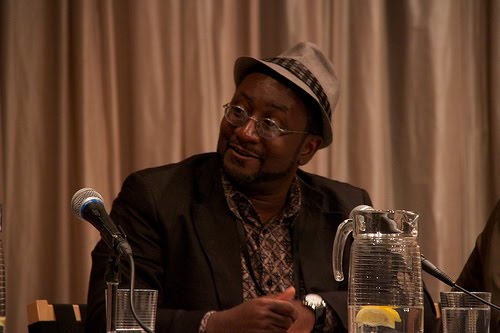Q: You wrote about this before but I just want to be clear. Is there suh a thing as luck? How do you define it? How do you define it in your novels? Is P lucky? Are you lucky?
A: Some people define luck as a magical force that governs the dice as well as one's life. One's "luck" is the same as one's "fate." For example, Bubba is lucky because he is the healthy, handsome firstborn son of a billionaire. Bubba becomes unlucky when he drowns in the family swimming pool at age 6. As "fate" would have it, Bubba died young. We say that Bubba was unlucky, unfortunate, ill-fated . . .
It is clear to me that this kind of fate or luck, regardless of what we call it, is a kind of deity that controls all--it is the deity of what will be will be; it is the deity of what is.
But when many, many bad things happen to us, we feel especially unfortunate, or unlucky, or ill-fated, or "cursed."
Bubba2 recalls a day when his money was short, his piece of crap car was not running, his other piece of crap car was not running, he had no means to pay a mechanic or to rent a car, he needed to get to work for an important meeting, he was in college and needed to get to class after work for an exam, his cable and water had been turned off that morning--did I mention already that he was short on cash? Actually, he was overdrawn at the bank, so he was shorter than short--he was negative. Bubba2 had nowhere to turn. So much bad luck. He felt cursed.
Bubba2 got down on his knees and prayed . . . to whom?
He prayed to the deity that controls what will be. In Bubba2's mind, the universe is controlled/ordered by a sentient being who can be appealed to. In other words, prayer and supplication to this deity can tip the universe in one's favor--it can turn one's bad luck into good.
Bubba3 is sitting at a poker table. He has lost all of his money except for the thousand he has put into this last pot. In other words, Bubba3 does not have a penny left, not in his pocket, not in his bank account, not in the world. But the pot has $10,000 in it. Bubba3 is holding aces. His opponent is holding kings. The dealer has flopped an ace and two spades--three aces for Bubba3! Bubba3 is in the lead. Bubba3's opponent can only win if the dealer puts four spades out there to give him a flush, which will beat Bubba3. On the next card, the dealer puts out the third spade. One more card to go. Any random card and Bubba3 wins. But if it is a spade, Bubba3 loses.
Bubba3 is praying for . . . luck?
But this is the deity of what will be. If it will be a spade, then it will be a spade. If it will not be a spade, then it will not be a spade.
If it is not a spade, then Bubba3 will win and be called lucky.
If it is a spade, then Bubba3 will lose and be called unlucky.
There is no luck. There is no luck, the defied kind. There is no good luck. There is no bad luck. There is simply what will be.
The great thing about gambling is that it delineates in a highly readable fashion what will be. Over and over and over again. Each spin of the wheel says this is what it is. This is what it is not. Each flip of the cards is a page from the diary of fate. This is what it is. This is what it is not.
Gamblers sit all day reading their fate, not controlling it, but reading it . . . this is what happened . . . this is what did not happen. Some things they read are good. Some things they read are bad.
They can hope and pray all they want, but they will get the truth a second after the other player shows his/her cards.
Luck and bad luck, then, can only be determined after the play has played. "Luck" and "bad luck" are titles they affix to decribe the sum total of events that have already happened. Thus, "luck" and "bad luck" don't really exist in the way people think--as predictors of what will happen. They are desciptors of what just happened.
Nevertheless, in your parlance, I can say that I am not/was not a "lucky" gambler. I played what I played and lost more than I won.
P was not a "lucky" gambler.
Most gamblers are not lucky.
The laws of probability, a subject I will perhaps tackle later on, say that the "house" games gamblers play will most of the time result in a loss for the gambler and a win for the house. Thus, all gamblers who play slot machines and roulette are likely to lose. This is not luck. This is a plan. This is a computer program.
But when you win at the slots, you "feel" lucky.
Well, it certainly is not skill that earned you the win, but is it really luck? Can you take this so-called luck and do it . . . again?
You are not lucky, no. But what will be will be.
Thanks,
Preston

No comments:
Post a Comment